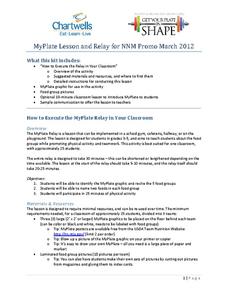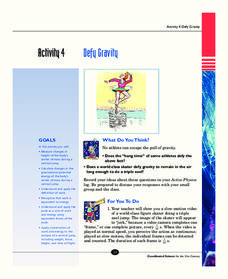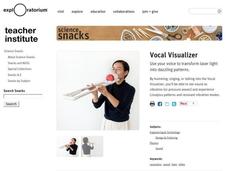Teach Engineering
What's Wrong with the Coordinates at the North Pole?
Here is an activity that merges technology with life skills as individuals use Google Earth to explore the differences between coordinate systems and map projections. The self-guided activity is the fourth segment in a nine-part unit....
South Gloucestershire Council
Animal Classification: A Collaborative Sorting Activity for Key Stages 2 & 3
Introduce the logic behind a dichotomous key or administer a group performance assessment with a fun and challenging classification lesson. With explicit instructions for the teacher and for collaborative groups, as well as engaging...
Novelinks
Zach’s Lie: Guided Imagery
Close your eyes and picture a time where you decided to tell the truth to someone. What were you wearing? How did you feel? Such prompts begin a guided imagery activity for Zach's Lie. Directions for creating an environment conducive to...
DiscoverE
LIDAR: Mapping with Lasers
We would be lost without maps! How are they made? Introduce junior topographers to LIDAR technology with a fascinating activity. Set up a mock city, then have learners operate a laser measure to determine the shape of the landscape using...
DocsTeach
Red Record of Lynching Map Analysis
Long before the civil rights movement, leaders were working to secure equal rights. An informative activity explains the 1922 anti-lynching campaign with a map. Scholars analyze the map, complete a worksheet, and participate in group...
Cartwells
MyPlate Lesson and Relay
Youngsters are up and moving in an exciting relay race designed to help them better understand where common foods fall on the MyPlate nutritional guidelines. Working in teams, they identify images of foods and name what food groups...
Howard Hughes Medical Institute
Biodiversity and Evolutionary Trees
Compare what shells look like on the outside with what makes that happen on the inside. Scholars begin by sorting an various seashells by their physical characteristics into phylogenetic trees. They then conduct a DNA comparison of...
PBS
Primary Source Set: Little Women by Louisa May Alcott
What did Jo write her stories with? How did the March sisters dress? A primary source set designed for Louisa May Alcott's Little Women prompts learners to look over images of household items and clothes from the 1860s before...
American Chemical Society
Diapers: The Inside Story
There shouldn't be any accidents with this activity! An inquiry-based lesson has learners explore the absorption properties of the gel compound in diapers. After testing its properties, they learn the science of the molecules that make...
Teach Engineering
Quantum Dots and Colors
Introduce teams to quantum dot solutions with an activity that has them expose solutions to a blacklight, observe the colors, and take measurements. Groups graph the data and analyze the dependence between particle size and...
Teach Engineering
Inside the DNA
Get your class to take a closer look at DNA. Pupils conduct research to determine the methods used by scientists to analyze the molecular structure of DNA. The class members investigate different types of molecular imaging along with gel...
University of Wisconsin
What’s a Square Foot Anyway? Laying Out the Design Plan
Clever! Participants don square-foot cardboard shoes to mark out the rain garden plot that they have spent the last few weeks designing. In this way, they are practicing scale modeling as well! Note that this lesson is part of a unit,...
Exploratorium
Resonant Rings
Physical or earth scientists construct this clever contraption to demonstrate how size effects frequency. Several paper rings of various sizes are taped onto a board and shaken to create vibrations. The resonant frequencies are easily...
Novelinks
Words by Heart: Guided Imagery
Sad, depressed, miserable, inconsolable, forlorn: so many synonyms have a lot of variety with their connotations. Through the guided imagery activity, writers explore the use of connotation and its influence on imagery and description by...
PBS
1000 Words
A picture really can speak a thousand words—no matter how old! Scholars become history detectives as they learn how to analyze historical photos and evidence to uncover the past. The fun hands-on activity makes history come alive through...
It's About Time
Defy Gravity
Test the limits of gravity while encouraging full class participation with this thrilling lesson. Pupils investigate the meaning of work and how it is equivalent to energy. They explore the joule and apply it as a unit of work. They...
Exploratorium
Cylindrical Mirror
Using flexible mirror-like paper, physical scientists experiment with images produced by curving it and looking into its reflective surface. They find that concave mirrors cause reflected light waves to cross and actually flip the image...
Exploratorium
Bernoulli Levitator
Two versions of this activity are presented for you to choose from when teaching about Bernoulli's principle in your physical science class. One is a hands-on activity, while the other would be best used as a demonstration during...
Exploratorium
Touch the Spring
Concave mirrors and the images they produce are traditional topics in the physics classroom. This resource explains how to set up an investigation of them, and it provides you with the explanation of concepts.
Exploratorium
Vocal Visualizer
Make sound visible with an activity that provides directions for how to build a vocal visualizer meant to create light patterns. Making noise into the visualizer causes a mirror to vibrate, reflecting a laser beam, and creating...
NOAA
How Do We Know?: Make Additional Weather Sensors; Set Up a Home Weather Station
Viewers learn about three different weather measurement tools in installment five of the 10-part Discover Your Changing World series. They build weather vanes to collect data on wind speed, barometers to determine air pressure, and...
Exploratorium
Corner Reflector
If you set up a triad of mirrors into a corner figuration, they act as a kaleidoscope, bouncing light waves back and forth indefinitely, changing the light that your eyes perceive. Although the materials required are very specific and...
Savvas Learning
Let's Get Moving
Scholars examine, cut, paste, and sort 12 images featuring different types of movement in order to show what they know about energy—potential and kinetic.
MENSA Education & Research Foundation
Roller Coaster Mania!
Raise the energy level of your physical science class with this exciting hands-on activity. Applying their knowledge of kinetic and potential energy and Newton's laws of motion, young engineers use foam tubing and marbles to create...























